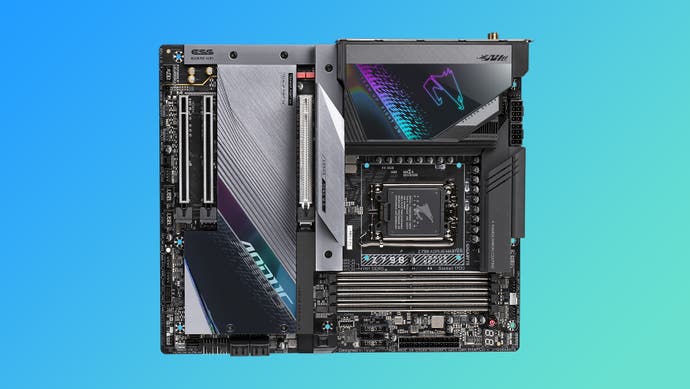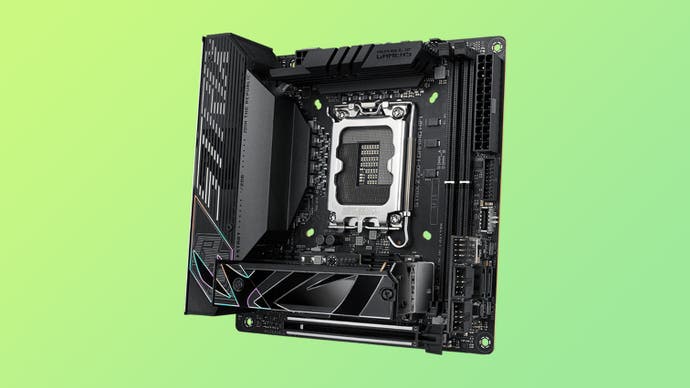Intel Core i9 13900K and Core i5 13600K review: an effective redoubt against AMD's Ryzen 7000 advances
Z790 overview and motherboard analysis.
As mentioned in the introduction, we performed the majority of our Intel 13th-gen testing on a Gigabyte Z790 Aorus Master motherboard after running into performance and stability issues with our usual Z690 board, the Asus Maxius Z690 Hero, running the latest publicly available BIOS.
In theory, Z790 is a relatively minor update on a platform level and uses the same LGA 1700 socket, but many motherboard manufacturers may be offering revised designs that go beyond the extra PCIe 4.0 downstream lanes that the new chipset is capable of - things like additional features, more robust power delivery and support for higher memory frequencies. As with Z690, both DDR4 and DDR5 options are available here, with DDR4 being the better value choice and DDR5 offering superior performance in most tasks.

Looking specifically at the Z790 Aorus Master for a moment, it's clear from the off that this is a very potent board with a pricetag to match. There are five NVMe slots (one PCIe 5.0, four PCIe 4.0, all with toolless installation), a 20+1+2 phase VRM design, an impressively hefty thermal solution, 10-gigabit LAN and WiFi 6E. You also get 11 USB-A ports, three USB-C ports, DisplayPort, two 3.5mm ports (mic/line out) and an S/PDIF out; buttons for clearing the BIOS or updating it without a CPU installed are also provided on the I/O panel. Of course, there's also integrated RGB lighting and plenty of RGB headers, if you like to have everything sychronised.
The BIOS will be familiar to anyone that's used a modern Gigabyte motherboard - its arrangement and appearance looked quite familiar to me having used the X570 Aorus Master as the basis for my work PC a few years ago - but there are some enticing new options. Specifically, there's a 'gaming' mode which disables all of the efficiency cores, which should allow the performance cores to hit higher clock speeds more often due to a lower thermal load. This obviously nerfs multi-core performance (eg in content creation tasks that can soak as many threads as available, such as transcoding video, rendering 3D scenes and compiling code), but might still be useful for folks that want to squeeze out every last drop of performance in CPU-limited scenarios. One thing I didn't particular appreciate in the BIOS is the extremely slow mouse speed, which makes using the simplified interface a pain - I opted for the keyboard controls instead. Similarly, the BIOS updater wasn't able to access my User folder, meaning I had to copy the BIOS file to a USB drive instead. Beyond these small annoyances though, changing settings and monitoring temperatures was straightforward.
In our testing, the Aorus Master has proven very stable with its latest F4 BIOS installed, and the content creation performance in particular (at nearly 500W load, as measured at the wall) speaks to the efficacy of its power delivery. Overall, certainly recommended, although we don't specialise in motherboard reviews and it's well worth reading or watching in-depth coverage!

The other motherboard we received is an Asus ROG Strix Z790-I Gaming WiFi. Unfortunately, this arrived the day before the embargo, so we've not had time to test it as of yet - but it's likely to be one of only a handful of Z790 motherboards in this form factor, and therefore well worth considering for small form factor (SFF) builds. I'm running the Z690 version of this board in the NZXT H1 v2, where it's proven capable - although the double-stacked NVMe arrangement isn't ideal. Look for more substantive coverage of the Z790-I down the road, as this could be the basis of a very powerful yet portable system...
For now though, let's wrap things up - what do we make of the 13900K and 13600K overall?
Intel Core i9 13900K and Core i5 13600K analysis
- Introduction, test rig and content creation benchmarks
- Gaming benchmarks: Flight Simulator 2020, Hitman 3
- Gaming benchmarks: Counter-Strike: GO, Metro Exodus EE, Black Ops Cold War
- Gaming benchmarks: Cyberpunk 2077, Far Cry 6, Crysis 3 Remastered
- Gaming benchmarks: Memory bandwidth analysis
- Z790: platform overview and motherboard analysis [this page]
- Intel Core i9 13900K and Core i5 13600K: the Digital Foundry verdict
